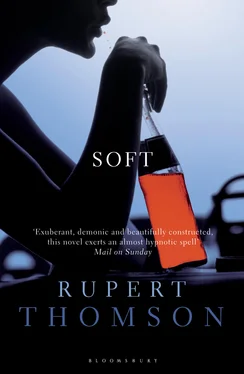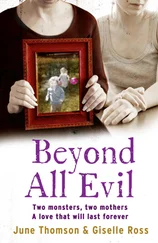There was nobody to see him off, of course, why would there be, and now the rain was coming down. As he waited outside the coach station, a large drop landed on his forehead. It rounded the ridge of scar tissue on the bridge of his nose and rolled into the corner of his left eye where it collected for a moment, like a tear, before spilling down his cheek. Savagely, he reached up, brushed it away. He would never have thought of taking a bus to London, but Sandy Briggs, who worked in the local betting shop, had told him it was cheaper than a train, almost half the price, so here he was, standing on the sloping concrete with his bags. It all felt wrong, somehow. Just looking at the name on the side of the bus gave him an unsteady feeling. Suddenly he wanted to hit someone. Either that, or go to sleep.
Inside, things got worse. There was a toilet in the back that smelled of disinfectant. There were TVs screwed into the roof. A girl slouched in the aisle with a tray of Cornish pasties and cold drinks. She wore a kind of air hostess’s uniform and plain black shoes with heels that needed mending. Pinned to her head was a stripy paper hat. You could have turned it upside-down and floated it across a pond. Video Rapide . He looked out of the window. Tourists in pale-pinks and pale-greens. Children screaming. The rain still falling, running into big square drains. It was warm, though. Sticky. He shifted inside his clothes, wishing he had worn less.
As the bus moved out of the station, a voice crackled through the speaker system. He didn’t listen. He could hear the tyres on the wet road. The hiss of brakes at traffic-lights, like someone lifting weights. He stared down at the fish-and-chip shops, the red-brick churches boarded-up. The girls at street-corners, their bare legs the mottled pink-and-white of brawn. One of them, dark-haired, awkward, reminded him of Jill. When you’re lying in bed at night and somebody smashes a bottle in the alley below, it can sound delicate, almost musical, like sleigh-bells. Sometimes there’s a noise inside your body that is just like that. He heard it every time he thought of Jill.
The bus gathered speed and the dark-haired girl was hidden by a bend. To the north the sky seemed to be clearing, a thin washed light streaming down into the fields. It wasn’t long before the red-brick buildings were gone, the grey rooftops were gone, and they were on the motorway, with nothing to look at, nothing to see, nothing to remind you of anything. Motorways were so empty, the land on either side withdrawn and featureless. If you spent your whole life on a motorway, he thought, you wouldn’t remember a thing.
The Scully family had driven him out of Plymouth, that was the truth of it. They lived on the same estate as he did, a whole rabbit-hutch of them. They had wide flat spaces between their eyes, and their skin was the same colour as their teeth, a sickly blend of grey and yellow. The Scullys believed that he had killed their Steve. They had no proof, of course, though he was known to be the last person to have seen Steve Scully alive and, on that basis, the police had taken him in for questioning. Nine hours he had spent in the station, nine hours straight, telling the same story over and over.
‘He was drunk. Out of his skin.’
Three policemen watched him from different parts of the interrogation room. It wasn’t the first time he’d been questioned in that room, but it was the first time he’d been innocent.
‘I didn’t lay a finger on him. It was him laying into me that did it.’
‘What,’ a policeman said, ‘self-defence?’
Barker shook his head. Returning to the estate at one in the morning, he had found Steve Scully on the fourth-floor walkway that led to his flat.
‘You’d been drinking,’ one of the policemen said.
‘Yeah, I’d been drinking,’ Barker said, ‘but not like he’d been drinking. He was swaying all over the place, like one of those snakes when you play them music —’
‘Like one of those snakes,’ the policeman said.
‘I was tired,’ Barker said, ‘and Scully was in my way —’
‘So you pushed him,’ the policeman said.
‘And he fell off the balcony,’ said another.
‘And he died,’ said a third.
‘Murderer,’ the first policeman said. Quietly. As though he was talking in his sleep.
Barker began again. You had to be so patient. You had to have the patience of Buddha, if that was what he was famous for: you had to sit there like you were fat and foreign and made of gold.
Scully had been standing near the top of the stairwell, just beyond the rubbish chute. It occurred to Barker that Scully had been waiting for him, specifically for him, because the first thing Scully said was, ‘You don’t scare me, Dodds.’ He tried to edge past Scully, but Scully blocked the way. Stood with his legs apart, swaying from the waist up. ‘You don’t fucking scare me.’ His finger jabbing the air between them as each blurred, beer-tinted word came out.
‘Is that right?’ Barker leaned forwards until he was so close that it was hard to focus. He could smell the crisps on Scully’s breath. Beef and onion, he thought. Or it could have been sausage. He could see Scully’s attempt at a moustache, the hair straggling across his upper lip, thick in some places, thin in others, like the bar code on a pint of milk. ‘You know what?’ he said. ‘I just looked in your brain and there was nothing there.’
Scully took a swing at him. And missed. Barker was only inches away; it must have been a pretty wild swing. He watched the fist orbiting the sky above the courtyard. Then Scully staggered, lost his balance and fell backwards, over the balcony wall. Shoulders first, feet last. Like somebody doing the high jump. That new technique that came in during the seventies. What did they call it? The Fosbury Flop. But they were four floors up in a building on Ker Street and there was nothing soft to land on.
‘It only comes to here, the wall.’ Barker showed the policemen by placing the edge of one hand against his thigh. ‘Amazing it hasn’t happened more often.’
The policemen exchanged a long slow look. Barker had seen the look before and knew what it meant. They thought he was lying. It was a pretty good lie, though — so good, in fact, that it had almost slipped past them. And they were impressed by that.
Impressed. But not fooled.
‘You related to Ken?’ one of the policemen said.
‘No,’ another policeman said. ‘He hasn’t got the teeth.’
The third policeman smiled. ‘He could have, if we weren’t careful.’
Barker looked down, shook his head again. They had a routine going, like something you might see on TV. The only difference was, you couldn’t laugh.
‘It’s Dodd,’ he said at last.
‘Sorry?’ said one of the policemen.
‘The comedian,’ Barker said. ‘His name’s Dodd.’
The policemen looked at each other again. ‘Sorry, mate,’ one of them said. ‘Don’t follow you.’
‘My name’s Dodds,’ Barker said. ‘There’s an s in it.’
‘There’s an s in it,’ one of the policemen said.
‘Smartarse,’ said another, gripping Barker by the hair and twisting. ‘There’s an s in that too.’
From the window of the bus he watched the landscape passing, fields that weren’t really green, sky that wasn’t really blue. Everything watered down, washed out.
England.
There had been a moment when he found he was alone and all he remembered feeling was relief. At last, maybe, he could sleep. And then a sound from somewhere below. Not loud. Too far away to be loud. It could have been a person treading on a cardboard box. He walked to the parapet and peered over. Saw half a dozen cars parked in a diagonal row, their paintwork orange in the light from the streetlamp. They looked too still in that orange light. They seemed tense, as if they had muscles under that smooth, shiny skin. As if they might scatter suddenly. The way cockroaches do. Scully’s body lay in the gap between two vans. He wasn’t moving. Barker leaned on the low wall, staring down. There was no hurry. Nobody could fall that far and not be dead. You don’t scare me . Famous last words.
Читать дальше












